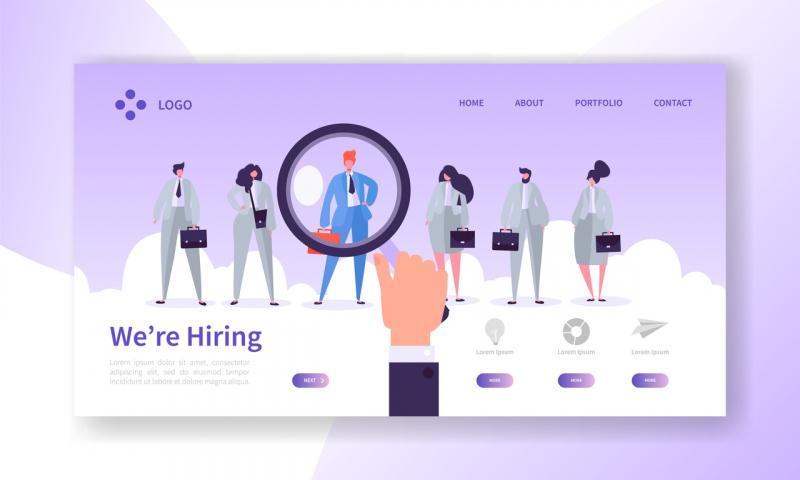First steps
The first thing that must be said is this: don’t hesitate to respond to job offers that call for the kind of experience you don’t have. Today’s employers understand that the world has changed, and so has the job market. Everyone’s trying on new professions, pivoting their careers, taking intensive professional courses, and so on. With all this taken into account, having the relevant kind of higher education is no longer as important. This is especially relevant for students and recent graduates: any recruiter knows you’ve spent the past few years deep in studies, and so they won’t expect you to have any meaningful work experience.
Most importantly, remember that not only are you being chosen, but you are making a choice, too. Do your best to pick a job that’s truly appealing to you, and where you’ll feel at home among others. Your first job is the most important one and could define your entire career.
On the other hand, don’t try to force yourself into your favorite company by responding to any and all job openings. Will this attract the recruiter’s attention? It probably will, but not in a good way.
Making a CV

Your resume makes the first impression, so approach it sensibly. It should match the job, be brief, concise, and structured. Even the most advanced professional’s work experience can be summed up in two or three pages; for a beginner, one would be enough. Try not to cram too much in there – no one’s going to comb through 20 pages.
You can find plenty of ready-made templates online; even HeadHunter has a handy built-in tool. Google Docs has templates, too. Then there are specialized websites like CVmaker, ResumUP, and Pathbrite. A bright, stylish CV will certainly catch employers’ eyes, but it shouldn’t be overly complicated, either. Avoid templates that include sections that you have nothing to fill with.
A basic CV has three parts: your photo and contact info; your education, experience, and professional qualifications; and a bio. A photo of yourself in the header is a given, as a “faceless” CV will be soon forgotten. The photo should be of good quality, in portrait form, with your face seen clearly and should not include any other faces. It’s highly preferable that it not be a vacation, party, or family reunion picture. Don’t forget to get your social media in order, as well.
Describe your desired job position in the name of your CV. Beginners afraid of being overlooked often state several job titles in their CV, such as: “Marketologist/Analyst/Developer/Designer”. This will only make recruiters wonder if you even know who you want to be. The more questions your resume raises, the less likely you’ll be contacted.
Keep in mind that on websites like HeadHunter, having several different CVs made for different positions means employers will be able to view all of them.
Education and experience

First of all, only list relevant experience. Sure, you may have worked part-time as a waiter, bartender, barista, and so on. It is no doubt a helpful experience, but don’t cite it if you’re applying for a job in IT. You can still give it a mention when describing yourself, but don’t let it take up unnecessary space in your experience list. If you’ve spent time unemployed or changed lots of jobs in a short period of time, say it outright – starting your relationship with an employer with lies is definitely not the way to go.
Don’t just list your workplaces; explain what your responsibilities were. Describe the results you’ve achieved – these are your specific accomplishments that will help recruiters decide in your favor.
Having a portfolio is a massive advantage, and is probably what a potential employer will notice first. Just make sure you only include content that doesn’t violate copyright or any NDAs.
Education

When talking about your education, always note whether you’re currently a student or have previously acquired a Bachelor’s or Master’s. If you’ve taken academic leave, be prepared to answer questions about that. Even if it was for academic, not personal reasons, don’t hesitate to share: your employers are people, too, and probably had the same issues as you back in the day.
It’s never too bad to cite your participation in university projects, conferences, competitions, hackathons, and so on. All these things help show you as an active and enthusiastic individual. Extracurricular and continuous education, such as professional development courses, summer schools, should also be mentioned as long as they’re relevant. List your certificates, too, especially if they’re from Google, Oracle, or other high-profile companies. Certificates from Stepik, Coursera, or other online services are also good as long as they’re related to the position you’re applying to.
Bio

This is likely the most divisive section of the CV, and everyone does it their own way. It’s difficult not to repeat yourself in the bio and the cover letter. Here, everything is up to you: some recruiters dislike reading about applicants’ hobbies and interests, while others say this is the only way to glean one’s personality from among the dry data.
One thing you definitely shouldn’t be writing about are your personal qualities: you’re far from the first to boast about doing well under pressure or being sociable and a quick learner. Besides, these are highly subjective descriptions that cannot be tested or confirmed.
Instead, describe your professional interests: explain what you’d like to do and learn, as well as what relevant material you’ve been studying. You can also talk about your sporting accomplishments, what you’ve done as a student, your freelancing or volunteering experience, and so on.
Cover letter

Are cover letters necessary? Absolutely. This doesn’t mean, of course, that you won’t get an interview without one, but applicants with cover letters will always be considered first. The letter is your chance to draw attention and to find a connection to the potential employer. It’s important that you make a new cover letter for each company and each position; don’t “carpet-bomb” everyone with the same identical text.
The goal of a cover letter is to demonstrate what you bring to the company and why you’re interested in the job. Use to quickly summarize your education, relevant experience, and what you find appealing about the company and the position you’re applying to. The letter is the best place to write about your accomplishments as a student, but keep it balanced: the cover letter and the bio can refer to the same events, but shouldn’t repeat one another.
The letter should be structured, easy to read, not too short (HeadHunter’s default single-line template is decidedly a no-go), but not novel-size, either. Everything in it should be relevant. A well-written cover letter is a powerful tool that could easily outweigh drawbacks such as the lack of experience, education, or even of an open position at the company of your dreams.
Test assignments
It’s likely that you’ll be given a test assignment before being invited for an interview. Oftentimes, the assignments have to be done right at the interview, so be ready for that.
Definitely inquire with your recruiter about the deadlines, unless you’ve already been given those. Don’t try to do the task perfectly, just do it according to the assignment. If you can’t hit the deadline, send in whatever you’ve got done. At this stage, nobody is expecting you to go above and beyond.
Preparing for the interview

Before going to the interview, study the job description carefully: it could be that you’ve responded to so many job listings, you can’t tell which company you’ve been invited to. So before you go, study all the details and sift through the company’s website and social media. Review the requirements for the job, as you’ll probably be asked about those at the interview.
If something’s happened and you know you’ll be late for a valid reason, or can’t come in at all, inform the company in advance. Making your potential employer waste precious time isn’t going to do you any favors. Verify the address and time of your interview and jot down the company’s contact info and phone number.
For most people, the oral interview is the most difficult part, especially if it’s their first. Don’t lose your head or nerves: your interviewers are well aware of the stress factor, but acting too nervous and reserved will only make it more difficult for them to maintain a proper conversation.
“Tell us about yourself” is the cookie-cutter question that interviewers ask just to get the conversation started. How do you respond to that? Definitely not with “it’s all in my resume.” Talk about your education, which subjects you liked most or found useful at university, what skills or insights you’ve gained as a student. It’s good to talk about the cases and projects you’ve worked on. Be ready to answer questions about your course projects and theses. If you’ve already got some work experience, talk about that.
Remember that a job interview is a dialogue, not an interrogation. If you feel lost or nervous, say so. The most important thing is to remain engaged, and then your interviewer will be able to help – it’s one of their responsibilities, after all.

Questions like “where do you see yourself in 5, 10, 20 years” are still popular among HR staff. If you don’t know the answer to it, just say you’ve never thought about it. Don’t try to present yourself as overly ambitious: if you’re starting at the lower tier, but aiming to make manager in six months, that’ll only raise questions for the employer.
You may be asked if you’re considering other offers at the moment and which things you’re looking for in a job. Be honest: if you need a high salary, say so, and the company will take that into account when making their final offer. If you’re looking for challenging work or professional development – say that. Remember that the company chooses you, but you, too, choose the company, which is why it’s important to be honest with yourself and your employer.
Don’t be upset if you don’t get the job – even the top professionals get rejected sometimes.
Where to look
Aside from the ubiquitous HeadHunter, there are two other services in Russia that specialise in young specialists, students, and graduates. Grintern and FutureToday list offers that don’t require any work experience, as well as internships at some of the nation’s top companies. There are plenty of Telegram channels that report on jobs for fledgling specialists – Job for Junior or Grow IT, for instance.
ITMO University’s Careers Center is a great place to start. You can also meet and chat with employers – and maybe even get a job offer – at various meet-ups and conferences. If you’re looking for a job in IT, check out IT-Events and Meetup.
Many companies have their own in-house training programs. Digital Design has IT University, which draws in intern teams once every semester. So if you’ve got your eye on a company, but it has no open positions for you, don’t hesitate to write to its HR team or ask for an internship; in all likelihood, they’ll take you in or suggest an alternative.





